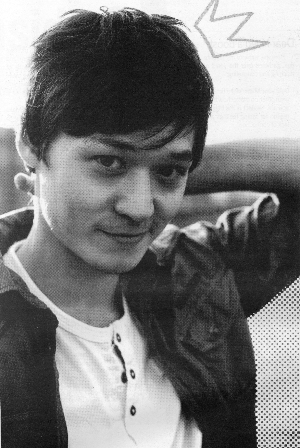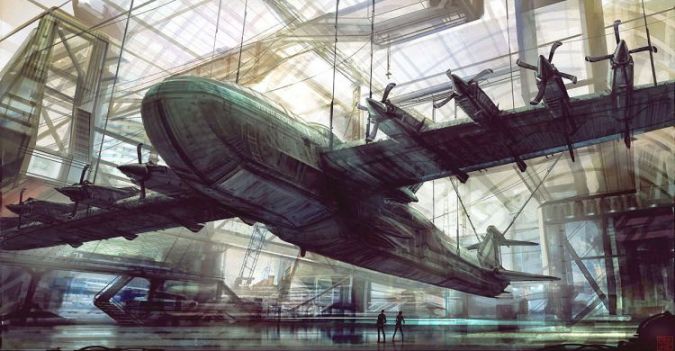![]()
The Words of the Ruwwe Family
|
|
The Words of the Ruwwe Family |

Lorenz Hideyoshi Ruwwe is a freelance concept artist and illustrator working for clients from the entertainment business including filmmakers, authors, game developers and private individuals. He was born to a German father and a Japanese mother in Frankfurt, Germany. After finishing his Abitur in 2004 he began working freelance. His artistic skills are based on thorough self-learning and practical routine over the years. Other vivid interests of his include martial arts, film production and playing the guitar.
Question: Describe for readers your process, please.
Answer: I work digitally in Photoshop for the most part. Its painting and drawing, really, like you would on a canvas or paper with traditional media. You can practically mimic everything from pencil and chalk to gouache and oil colors by using certain digital brushes. With digital art, you have the freedom to experiment and make mistakes because you can easily correct if needed. That doesn't mean that the same art principles and techniques won't apply here as well. Understanding color, light, form and perspective is equally important when working digitally. The computer won't do digitally. The computer won't do the work for you like some people like to think. Mostly I do what is generally referred to as "speedpainting", an art form which was made popular by some of today's leading digital artists who developed speedy, effective painting techniques on the computer. It usually looks very loose in terms of the brushstrokes but reads well when viewed from a distance, containing all the elements of a successful painting. It is a very expressionistic style since it lives from its suggestive, sketchy quality. Speedpaintings usually focus on portraying mood, atmosphere or act as studies in order to learn and practice and usually don't take longer than 2 hours to do. Personally, I focus a lot on careful brushwork because it requires a lot of skill to do properly.
Other than that, I also create finished, "rendered" art which is more accurate and aims for photo- realism. Basically, you can paint up a piece as long as you like, adding more and more detail and tightness. Speedpaintings can always be brought to a more polished finish.
I usually don't have a fixed process because there are many ways to go about a digitally created artwork. Sometimes I like to sketch out things with lines before I colorize them. Digital art really combines all the art forms that are possible with traditional media, so depending on the task/ client's needs I can adjust styles and procedures.

Question: Where do you take from for inspiration?
Answer: Interestingly, the answer to this always changes slightly. Of course I am inspired by other artists' work, movies, books. But I think inspiration can be found in everything that surrounds you. There is beauty everywhere, really. Most importantly, having an open mind towards the world will help you get inspired because anything can trigger an emotion or spark an idea. Usually, written words help me visualize a concept more artistically and uniquely as opposed to looking at a movie or image for inspiration. Music is also very evocative in creating images in your mind. I usually listen to something while painting.
Question: Do you ever create art with other mediums?
Answer: Yeah, I still like to sketch and draw with pencils, pens and markers occasionally. Other than that, I hardly paint with gouache or oil anymore which I used to do before. But I also enjoy photography which I actually implement into my digital art to some extent.
Question: Can you tell us what first drew you to this art form and why?
Answer: I think it's the efficiency and versatility that is the strongest point of digital art. Like I pointed out already, you can ultimately draw and paint in any style you want. The only difference from traditional media is the lack of physical contact with actual paints and when you apply them with brushes on textured canvas, for example.
The liberty you have with digital art is unbeatable. Colors and shapes can be mixed, changed, arranged, etc. There is one downside for me which is that the work you create only exists as a digital copy on your hard drive unless you print it out. But these prints obviously lack the character of an oil painted original. On the other hand, you can store digital files much more conveniently without them experiencing any deterioration over time. Well, that is, until you have a hard drive meltdown.
Question: What are your future aspirations where the art world is concerned? Any long-term plans?
Answer: The industry of digital artists is booming, with new talents appearing constantly. Only 5 years ago there was significantly less competition in the field because everyone was just starting to really paint on computers. Remaining unique with your art is most important, I guess. For a while it used to be about who could master digital painting techniques the best but in the end, art is not about technique but expression. This is what I have to work on, I think. Somehow I feel I have not yet fully expressed my innermost personal art yet. But then, the work I mostly do is concept art and illustration, aimed at the entertainment industry. It's commercial art for book covers and movies and games, really. Not fine art which you see in museums. I would like to constantly improve like I have always wanted and keep doing what I do, with development in one way or another. I think the key to this is trying to stay inspired and excited so I won't use up the passion in creating art. I never plan ahead into the future too far. Having an open mind for opportunities has worked best for me so far.